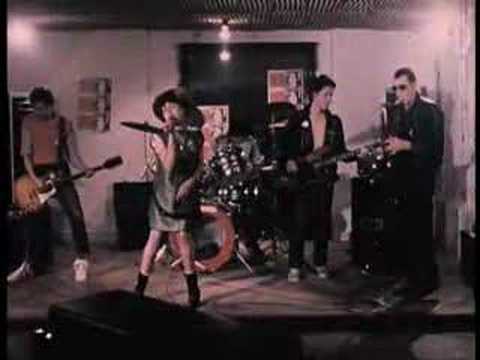It isn’t often that a punk star returns with new material that is as fresh, forward-looking and multi-dimensional as Poly Styrene’s new album Generation Indigo. A creative tour de force, it pulses with the energy and observational humour we know and love from her body of work with punk satirists X Ray Spex, but also touches on her strong sense of spirituality before diving into darker waters as Poly turns her day-glo beam onto issues such as racism (‘Colour Blind’), poverty (‘No Rockefeller’) and the war in Iraq, in the skanking protest song ‘Code Pink Dub’.
The voice of Poly Styrene is etched on many of our hearts as a piercing holler of a battle-cry, and on this album it’s clear that while the Styrene sound has matured, it is just as commanding – at times slightly reminiscent of Debbie Harry, shining with clarity and a kind of innocence. When we spoke to Poly, currently fighting cancer, that voice was still quietly strong as she explained she’s in the process of "trying to get better."
"In a way I’m glad I’m not writing the album now," says Poly. "I’d been watching the news a lot and it was just so sad, so many young men dying and it’s just about oil. The situation in Iraq is different now so that song [‘Code Pink Dub’] is of it’s time, but there are so many disasters at the moment, it’s like a nightmare what’s happening in Japan, in Libya – it would be a very different album.
"It’s an upbeat album. I wanted to put something positive out there. We need to get back to love and light and stop fighting over resources."
Killing Joke’s Youth produced Generation Indigo at his studio in Spain after hearing and loving Poly’s new output – and by all accounts, having Youth at the helm is always a demanding, highly productive, process, which often involves writing new songs every day. No sitting around drinking tea and noodling at this particular studio… "I came to him with 15 songs, not all of which ended up on the album of course, but he told me to go back to my hotel and write five more," explains Poly. "Some of them didn’t have enough hooks so I needed to work on that too. He can be quite tough but it was a good experience. Youth brought a lot of new elements into it."
The title, Generation Indigo, was inspired by Indigo Children, "the generation my daughter was born into, a generation that can change things", and the album is very much a family affair. Poly’s sister and also her daughter Celeste feature throughout on backing vocals, The Slits’ Viv Albertine, extended punk family, lends her distinctive guitar sound on the poignant, sensitive and somewhat spooky track ‘Ghoulish’, a song partly inspired by Michael Jackson. "It was written around the time he was dying and there were all these pictures of his nose and his white face and the make-up," says Poly. "It did look ghoulish but you could also see that maybe underneath the mask there was quite a nice person."
Poly’s ever-sharp weapon against misogyny (‘Oh Bondage, Up Yours!), vanities, clichés and poseurs, has always been the incisive sense of humour which shines through her lyrics from her early work with X Ray Spex to today. Humour is, of course, one of the most effective and intelligent ways to move things forward and bust issues wide open, and Poly has never stopped looking at popular contemporary culture with a satirical eye. Indeed, the pop culture and media obsession of today is ripe for parody…
"I was definitely thinking about that in the track ‘Virtual Boyfriend’," says Poly. "Everything is done with computers and devices, there’s so much technology now. It was just the idea that a young girl could have a virtual boyfriend who she never actually sees or touches, and then can just dump by pressing delete! I have had to pull away from that virtual world since being in here [a cancer hospice], I switched off my computer. I’d been on it 24/7, but I can’t do all that at the moment.
"The track ‘I Luv Your Sneakers’ is fun too, it’s humorous. That’s one of my favourites. When I did the X Ray Spex gig at the Roundhouse in 2007 I noticed there were a lot of young girls there and they had these sneakers on, that was the look. I also had some sneakers, little Rocket Dog ones, and they had diamante cherries on them, I loved them! They were child’s sneakers really but I’m a size four. So that’s song’s just about that, and that it’s nice to wear shoes that haven’t had to involve an animal dying."
Naturally, spirituality has long been an important part of Poly’s life. She lived for years in George Harrison’s Hare Krishna commune with her daughter Celeste in the 1980s, and her faith (and the regular meditation and prayer that is a daily part of that) has proved to be a great source of strength for her since she was diagnosed with cancer.
"Since I’ve been ill, when it was really bad through December I kept seeing images of Krishna in a meditational form. Now, as I’ve been getting stronger I’ve been seeing those images less, but I think I’ll see them again when I need to.
"I have an mp3 player which some Krishna girls brought me of an Eastern religious song, which I’ve been listening to, it’s very beautiful. Other than that I’ve not been hearing much music at all, although recently I was walking down the hall as I’ve been slowly trying to walk, and I heard Blondie playing on the radio. I found it so uplifting and positive to hear that. I do think music and sound is healing, it’s the vibrations. Scientists have proved it."
The beautiful, transcendent track ‘Electric Blue Monsoon’, which closes Generation Indigo, is the most direct reference here to Poly’s faith, and the perfect blue colour of Krishna, while still anchored by her London roots and a sense of fondness for the hard, glamorous city which was once her home (she now lives in Sussex) and which saw her rise to neon-bright infamy in the late 1970s, sealing her place in punk history.
"’Electric Blue Monsoon’ just sort of flowed through me one day when I was walking down Oxford Street," she says. "It’s very vibrant and everyone looked very colourful, there’s the line ‘Everybody’s out in the street, looking sugar-plum sweet.’ I was thinking of an image of an angel in the sky, wondering if there was an angel up there. And I was thinking of Krishna, who, they say if you see an image of, is the colour of an electric blue monsoon. It’s said that the blue of the sky is a reflection of that."
Punk and new wave made us look at life with a different slant, put things under an unforgiving microscope and strip everything back to create anew. Cut to today and Poly is still urging us to do the same, as are many of her early contemporaries such as The Raincoats’ Gina Birch, Viv Albertine, Mark E Smith. Sadly, for all its far-reaching positive and inspirational effects, punk didn’t change as much as it had initially intended to, there is still work to be done, more evolution, more revolutions, particularly for female artists. The word ‘female’ still seems to be used as a genre, but while there may sometimes be differences in how men and women approach music and instruments, surely music is music is music… The sense is now that female artists can be spectacular and creative visually, but, certainly in the mainstream, using Lady Gaga as an obvious example, the music is largely forgettable. The onus is still very much on being looked at. All you need to do is look at the trending topics on Twitter to see men being judged for what they are doing or saying, and women judged on what they look like or how shaggable they are/n’t.
"I agree, all the groups at the time were very young and we thought we were changing things, we made it clear we were concentrating on being a woman playing music as opposed to just being looked at, but after that it went extremely glamourised and sexualised again. I remember we went to see Dana Gillespie singing in a pub in Fulham near where we lived and she had quite a voluptuous figure, but she was just in a t-shirt and jeans. All the men in the front row were just shouting, ‘Get ’em off’. It was embarrassing.
"I was watching This Week last night, there was Andrew Neil and Michael Portillo, they’re not lookers, no make-up, talking about politics on TV. If a woman was doing she’d have to be all botoxed-up and all the rest of it.
"Then I saw a classical singer promoting her album on TV and she was very beautiful – that’s great, but we didn’t hear any of the album; it was all about how lovely she looked. Classical music used to be for listening to, but it’s as if male composers uplift us with their music, and women are supposed to uplift us with how they look, their beauty.
"Being in [the hospice], the nurses are all so kind and do so much for everyone, what they look like isn’t important, they have so many great qualities.
"I had a guru who left the mortal world in December. He gave me a meditation on the spirit, it was a female spirit, very beautiful but it made me think about that; how this body is just a material body, like an outer shell. It will deteriorate and die, but we can leave something behind in our music or art."
Finally, what would Poly Styrene tell her younger self now, if she could give herself some advice?
"I was very conscious of being taken seriously and not seen as a sex symbol," says Poly. "I did cover myself up a lot with my clothes. I had a very quirky style but I wanted to be respected for my music, my lyrics specifically.
"I once said I would shave my head if anyone tried to turn me into a sex symbol, and I did it. It was more for emotional reasons, too, but I really felt strongly about not prostituting myself in order to be heard. That sounds a bit over-dramatic now. Looking back I would probably tell myself not to be so afraid of that part of myself.
"Beauty and glamour are still such a big thing though. I mean, now I’m in here and I’m not looking my best, I’m on steroids and all sorts of medication, but I just think about the female artists who have had success in recent years and made a lot of money… they all look beautiful, everything is glamourised, it’s such a huge pressure on women. And will anyone remember the music?"
‘Virtual Boyfriend’ is out this week, while the album ‘Generation Indigo’ is released on March 28 and available from Amazon as a Limited Edition CD, from iTunes with a bonus track, and from the official Poly Styrene site as a special album/LP fan bundle.





